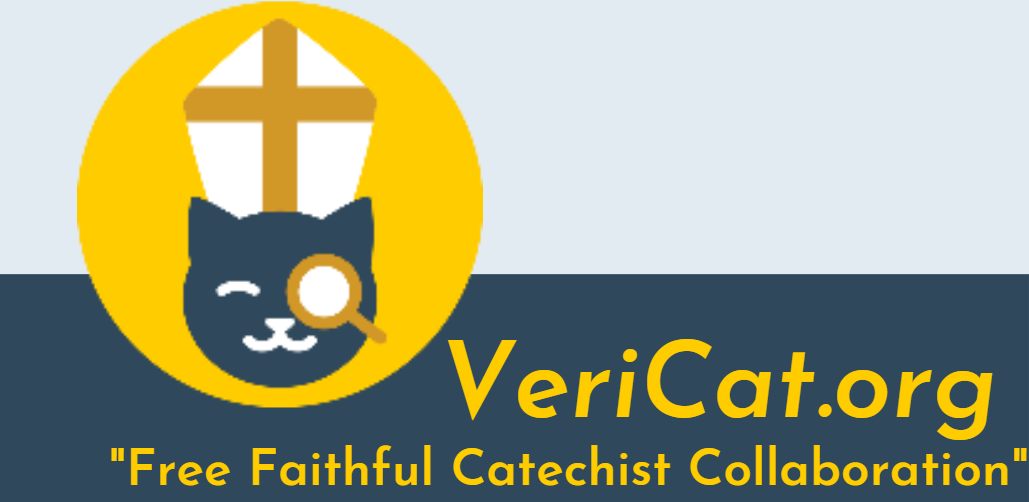Why bother making/supporting VeriCat? Most projects shouldn’t be embarked upon because usually someone else has already done a similar project in better fashion and in vain is the effort expended which only serves to make the better older projects more difficult for people to find. In this mindset we spent A LONG TIME trying to find similar projects/websites, but unfortunately found nothing like VeriCat and so endeavored to create VeriCat.
There are various other amateur and professional Catholic Catechesis websites out there making content (and we thank them for their charity), but none that serve as a means of soliciting content from amateur Catechists to share their work with larger audience, filtering out the effective from the boring content, establishing publicly available reasonable assurance of orthodoxy, allowing users to provide feedback, and supporting Catechists in their administrative/public speaking/etc skill development in a grass roots community (for free) like VeriCat. Below is a list of similar websites and explanation of how they are dissimilar to VeriCat.
Catholicreligionteacher.com : Makes content publicly available. No verification of orthodoxy.
Catholicteacher.com : Provides lesson plans and ideas. Lack of exegesis structure, no verification of orthodoxy, lack of theological focus.
Thereligionteacher.com : Provides lesson plans and ideas, quite well. Some free sample materials, other materials cost money or annual membership fee. No verification of orthodoxy, apparently only material from one contributor.
Lessonplanet.com/lesson-plans/roman-catholic/all : Provides lesson plans. Not completely free, no verification of orthodoxy.
Home – Catechist’s Journey (loyolapress.com) : Some free catechist training materials and affirmations. Users can post replies. Pushes users toward buying/learning to use Loyola Press materials. Top down model, no user submitted materials.
https://antiochian.org/dashboard?name=christian%20education : Provides resources. No verification of orthodoxy. Not Catholic.
Amazing Catechists – Teaching and learning the faith together : Perhaps the closest thing to VeriCat, as they openly seek new content contributors and make free Catechetical materials and catechist tips. No forum. Style of a host of blog articles rather than a sortable database. No publicly available orthodoxy assurance mechanisms. Content submittal process less systematic/procedural than VeriCat.
catholicblogger1.blogspot.com/ “The Catholic Toolbox” Provides games, lesson plans, tips, and a host of external links. Essentially missing same things as all these other websites.
Marian Catechist Apostolate | and associated “therealpresence.org” library of Fr. Hardon materials. Great publicly available Catechist Formation Program, with small membership fee for extras. Geared towards Catechist spiritual formation and theological training (which it does very well and we hold this apostolate in high esteem)- lacks material geared towards those whom the Catechists will teach, tools for helping catechists teach, and inter-catechist collaboration.
Various Catholic Universities: Offer Catechist training/materials. Can be inordinately expensive. Often reputation of professor/institution relied on and a top-down model.
Various Diocesan Bishop’s Offices and the Vatican: Often provide in-person catechist training/certificates/networking opportunities. Top-down model. Some may perform similar to Verification File line by line verification activities in Nihil Obstat process, but don’t subsequently make such a tracing publicly available. Certainly the highest authorities and their charism to be promulgating the Faith. VeriCat hopes to help provide tools for those assisting their mission.
In summary, nearly none of the above facilitate users submitting materials, leaving feedback, interacting in meaningful ways to build community & improving materials, or helping sort mediocre material from effective ones. Most uniquely, none go through the rigor of VeriCat’s Verification Files process.
It breaks my heart to say it, but many of the faithful in the wake of a mix of true scandals and gossip tainted perceptions don’t view imprimaturs with the unwavering assent they deserve (unless the imprimatur comes from a bishop that they revere as “one of the good ones”). This phenomenon appears to be as prevalent in “traditionalist” communities as it is in “[insert other artificial division of the Body of Christ here]” communities. For the sake of credibility with all potential audiences, VeriCat seeks to gain trust and set a new standard for others to follow with respect to explicitly tracing statements within catechetical materials to their Magisterial origins and making such traceability available to everyone through Verification Files. This would seem to us the antidote to the poison of “well you say your catholic celebrity/bishop said this, but mine said the opposite so forget you” types of conversations that are so prevalent online and even in person within the Catholic community today.
Note: VeriCat does intend to pursue Imprimaturs for it’s most popular or controversial content in the future and has obtained guidance from their local ordinary that given the mechanisms in place to provide reasonable assurance of orthodoxy and so long as a disclaimer that Magisterial authorities have not yet reviewed the materials is utilized then no imprimatur is needed for materials disseminated on VeriCat.org . Most other Catholic websites don’t have imprimaturs on their materials nor a disclaimer that the material has no imprimatur nor a note that they got their local ordinary’s permission.
If any of the above has resounded with you, consider joining our mission by being an active user of the website, telling your friends, Volunteering, or Donating.
